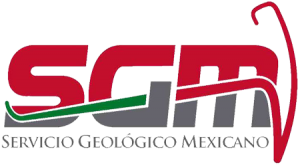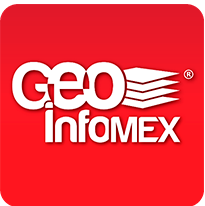VANCOUVER, BC, June 13, 2023 /PRNewswire/ – Vortex Metals Inc. (TSXV: VMS) (FSE: DM8) (OTC: VMSSF) (“Vortex” or the “Company”) is pleased to provide a comprehensive overview of the exploration work completed to date at its Zaachila Copper project in southern Oaxaca, Mexico. This update comes in light of the recent commencement of surface geological activities and successful completion of the environmental field study conducted by Mexican environmental firm Ambiental y Social Servicios Integrales (ASSI), further highlighting the Company’s progress.
Vortex Metals’ Chief Executive Officer Vikas Ranjan commented, “The exploration activities conducted previously by the late David Jones, uncovered remarkable prospects for the Zaachila project, featuring exceptional exploration targets within a geological environment similar to our Riqueza Marina project, located 30 km to the north. As we complete our Environmental Baseline Study and continue geological assessments, we are advancing towards the submission of an Environmental Impact Assessment (EIA) to the Federal Environmental Office, The Secretariat of Environment and Natural Resources (SEMARNAT), therefore fulfilling the Mexican government’s requirements for proposed drill targets. We believe the EIA will be completed and submitted within the next 3 to 4 months, encompassing a refined definition of the drill targets at Zaachila. Following its successful submission, Vortex will focus on obtaining the drill program approval from the Mexican government.”
The work summarized below provides background on a roughly >5km copper-in-rock anomaly hosted by a package of sub-marine volcanic breccia and debris deposits intercalated with ‘exhalite’ beds or lenses. This package is located near the southern margin of a roughly parallel trondjhemitic intrusive complex and contains rocks with high contents of base metals and volatile elements (Sb, As) which are viewed as irrefutable evidence of proximity to a major hydrothermal discharge site. Coincidental gravity highs and magnetic lows beneath the surface copper values support the emerging target as an outstanding opportunity for Vortex (as outlined in the Company’s NI 43-101 report filed on Sedar).
Project Background
The Zaachila concession consists of 3,264 Hectares and is bounded on the south by the Pacific Ocean and is about 40 kilometers (km) southwest of Salina Cruz and 30 km southwest of Vortex’s Riqueza Marina project (Figure 1). Access to the project is excellent and is pierced by a paved two-lane highway. The project is located in the municipality of Santiago Astata where community leaders have consistently been supportive of exploration work. The project lies in the Zaachila ‘agency’ of the municipality, which remains the principal source for workers since early exploration activities.
Copper-gold mineralization contained within the Zaachila project area has been interpreted to represent the oxidized portions of volcanogenic massive sulfide deposits (VMS), a genetic class of mineral deposits. VMS deposits are strata-bound accumulations of sulfide minerals that precipitated at or near the sea floor in spatial, temporal and genetic association with contemporaneous mineralization (Franklin, et al, 2005). The Santa Marta VMS deposit (Minaurum Gold Corp.), located in Eastern Oaxaca and about 150 km east of the Riqueza Marina – Zaachila concessions, shares many similarities to the VMS occurrences observed in the Zaachila project area. Similar geologic settings with probable VMS deposits in Cretaceous rocks have been identified in Mexico at two major districts: Campo Morado (Guerrero) and San Nicolas (Zacatecas).
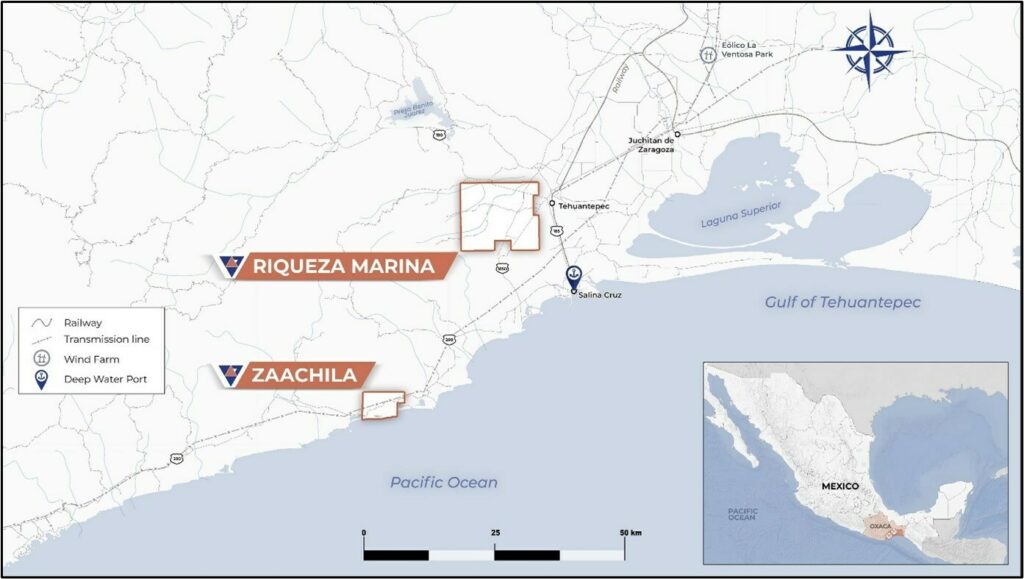
Project Geology
The geology of the Zaachila area, shown in Figure 2, consists of the volcanic debris or breccia aprons and contained ‘exhalites’ hosting or proximal to copper and gold mineralization. This mineralized belt is located immediately south of a trondjhemitic intrusive complex. The spatial association of the intrusive complex with the distribution of known Copper occurrences suggests they may be related in time and space. The contact of the intrusive complex is typically veined/altered with ferruginous carbonate, similar in appearance to the mineralized carbonate alteration along the base of the volcanic/debris flow breccia. Although the mineralized zone can be easily accessed with widespread exposures, the great majority of the copper-gold zone is covered by native vegetation and cultivated fields.
The majority of the copper mineralization identified to date occurs within two stratigraphic horizons: 1) immediately below the silica exhalite marker horizon within strongly sericitized and foliated volcanic rocks (basalts and ‘andesites’); and 2) within the matrix of the basal breccia unit at the contact with underlying exhalite and/or altered footwall volcanic rocks. The thick deposit of silica exhalite marks a hiatus in volcanism (i.e. quiescence) that abruptly terminated in breccia deposition, likely triggered by some tectonic event. The consistent and persistent occurrence of Copper mineralization within this stratigraphic sequence suggests it is VMS-related.
Based upon detailed field observations, the majority of Copper occurrences contain, in decreasing order of abundance, malachite, neotocite, azurite, chalcopyrite, and bornite. All mineralization is inferred to have been a sulfide and dominated by chalcopyrite; bornite (Figure 3) is locally dominant in areas with reported strong carbonate veining cutting footwall volcanic rocks, and these may represent ‘true’ stringer zone veining. Additionally, primary sulfide deposition is believed to have occurred in both sericitized footwall volcanic rocks and as matrix within the volcanic/debris flow breccias intimately associated with ferruginous carbonate alteration. The distribution of these breccias and contained copper mineralization mirrors the pronounced WNW-ESE elongate trend of the intrusive complex.
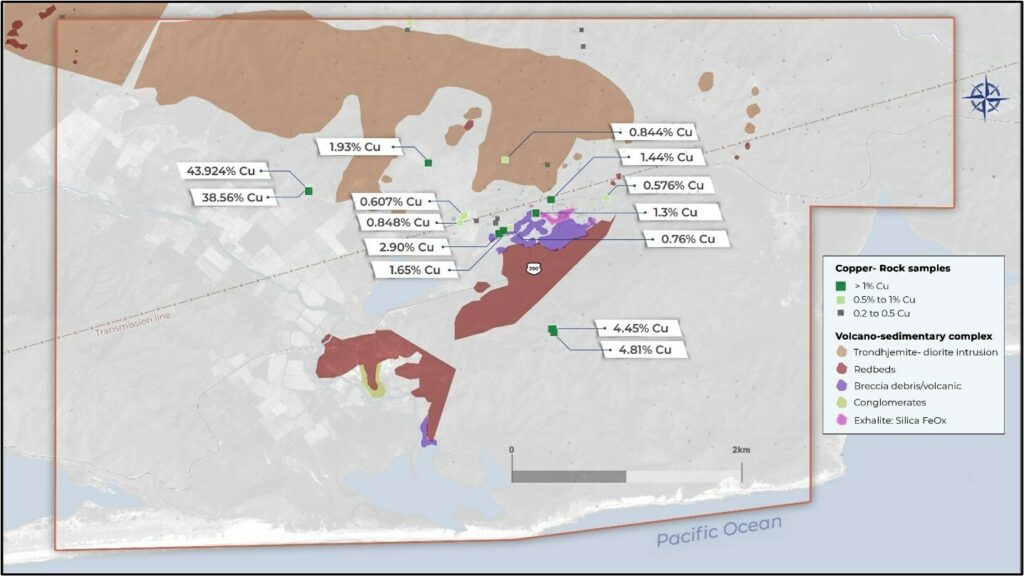
Project Geochemistry
Sampling over the Zaachila concession has identified Copper mineralization along a >5 km trend in specific stratigraphic horizons as well as within/adjacent to the trondhjemite complex. A total of 323 rock chips, 26 soil and 41 stream sediment samples have been collected to date. Select copper-in-rock values are presented above in Figure 2. Detailed litho-geochemical studies, using a 4-acid digestion, on rock, mineralized and unmineralized, were conducted on a large suite of samples across the Zaachila area by Dr. James Franklin (Franklin, 2019 – as outlined in the Company’s NI 43-101 report filed on Sedar). In summary, the Zaachila area appears to be similar in setting to those in the more primitive, ocean back-arc systems, such as at Tambo Grande (Peru) and San Nicolas (Mexico).
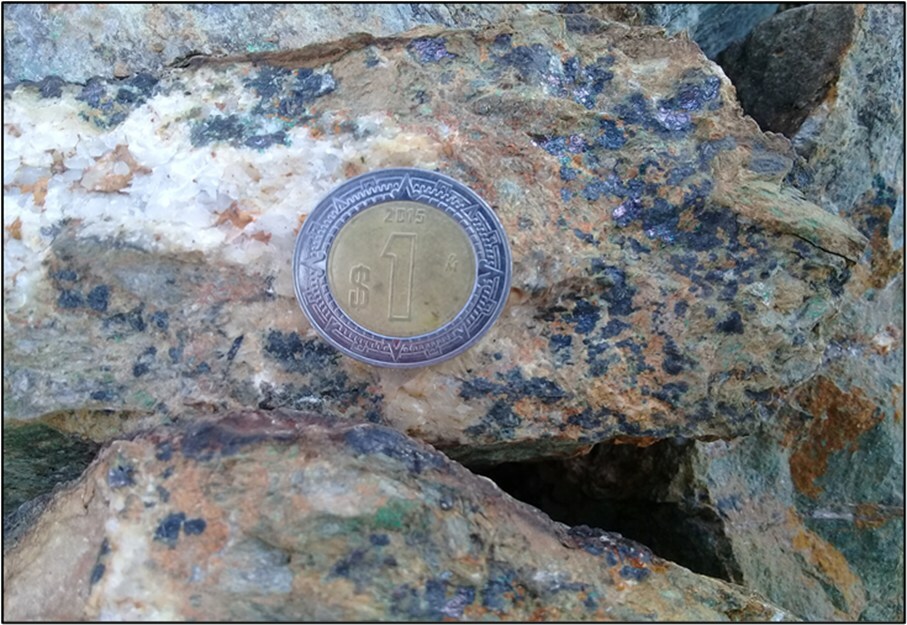
Franklin (2019), on the basis of this detailed analysis, evaluated the Zaachila targets utilizing factor analyses to define the primary target area (as outlined in the Company’s NI 43-101 report filed on Sedar). This area, defined in Figure 2, contains rocks with high contents of base metals and volatile elements (Sb, As) which are viewed as irrefutable evidence of proximity to a major hydrothermal discharge site. The roughly even distribution of both Na-depleted and Na-enriched samples is typical of the zone immediately adjacent to or just below a VMS system. The most anomalous As and Sb samples are at the extreme west end of the anomaly, or in the adjacent intrusion. All are associated with the exhalite unit, indicative of accumulation in the cap to a VMS system, as are the barite-enriched samples.
Project Geophysics
Geophysical studies have been conducted over portions of the RQMZ project area which revealed a combination of favorable lithologies, i.e., exhalates and gossans, associated with anomalous copper and gold values. Both ground gravity and magnetics were utilized considering that hydrothermal alteration associated with the VMS process destroys magnetite, resulting in a magnetic low, and massive sulfide deposition results in a gravity high. The combination of these two methods is widely utilized in VMS exploration. The geophysical campaign lasted from November 19th to December 16th, 2018 and consisted of 32.8 line-km of MAG and of 370 gravity stations over 35.4 line–km.
A combination of gravity and magnetics were employed over the Zaachila block and collectively reveal a ~1.5 x 1 km gravity anomaly centered adjacent to the most persistent and extensive surface shows of Copper mineralization (Figure 4) and a pronounced ~3 km linear magnetic low centered directly beneath this extensive surface Copper mineralization (Figure 5). The mag anomaly is likely related to magnetite destruction in the presence of high hydrothermal fluid flows. The gravity anomaly may be related to VMS sulfide horizons and/or to the more mafic margins of the trondhjemite complex.
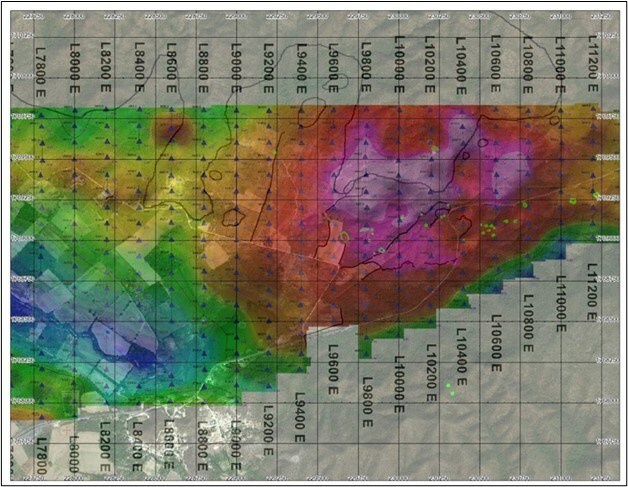
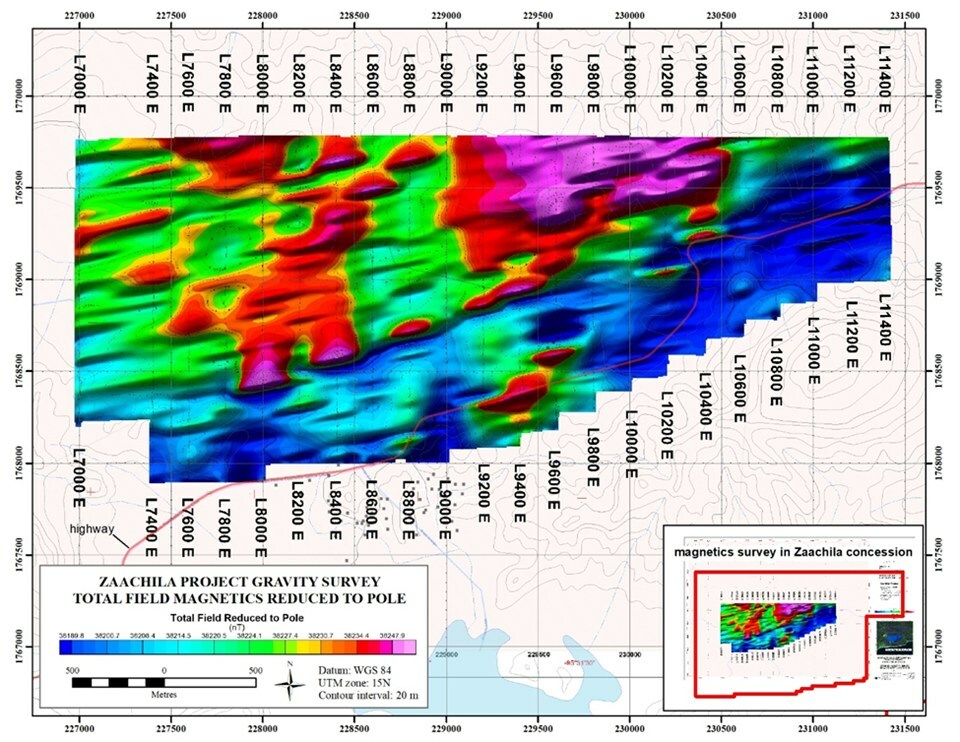
Proposed Activities
Over the next few to several months, Vortex will complete a trenching program providing geologic context to the historical copper anomalies outlined above. Many of these samples have originated in isolated or poorly exposed outcrops mantled by brush and soils. The rock exposures generated by the trenching will allow for detailed descriptions and sampling and hopefully facilitate mapping of the mineralized zones along the 5km VMS package. The result will be a clearer definition of the target zones (drill targets) within the environmental framework currently being documented in the baseline study.
Qualified Person / Quality Control and Quality Assurance
Robert Johansing, M.Sc. Econ. Geol., P. Geo., is a qualified person (“QP”) as defined by NI 43-101 and has reviewed and approved the technical content of this press release.
About Vortex Metals Inc.
Vortex Metals Inc. is the parent company of Mexican subsidiary Empresa Minera Acagold, S.A. de C.V., which is the owner of a 100% interest in two drill-ready high-potential copper-gold volcanogenic massive sulfide (VMS) properties (Riqueza Marina and Zaachila) in the state of Oaxaca, and a third high-potential gold property (El Rescate) in the state of Puebla. The Oaxaca projects incorporate the most highly prospective areas of high-grade copper mineralized surface exposures (‘gossans’) and prominent gravity anomalies along an emerging copper-gold VMS belt that includes Minaurum Gold’s (TSXV:MGG) Santa Marta project.
FORWARD-LOOKING STATEMENTS:
This press release may contain forward looking statements that are made as of the date hereof and are based on current expectations, forecasts and assumptions which involve risks and uncertainties associated with our business including permitting approvals, any private placement financings, the uncertainty as to whether further exploration will result in the target(s) being delineated as a mineral resource, capital expenditures, operating costs, mineral resources, recovery rates, grades and prices, estimated goals, expansion and growth of the business and operations, plans and references to the Company’s future successes with its business and the economic environment in which the business operates. All such statements are made pursuant to the ‘safe harbour’ provisions of, and are intended to be forward-looking statements under, applicable Canadian securities legislation. Any statements contained herein that are statements of historical facts may be deemed to be forward-looking statements. By their nature, forward-looking statements require us to make assumptions and are subject to inherent risks and uncertainties. We caution readers of this news release not to place undue reliance on our forward-looking statements as a number of factors could cause actual results or conditions to differ materially from current expectations. Please refer to the risks set forth in the Company’s most recent annual MD&A and the Company’s continuous disclosure documents that can be found on SEDAR at www.sedar.com. The Company does not intend, and disclaims any obligation, except as required by law, to update or revise any forward-looking statements whether as a result of new information, future events or otherwise.
Neither the TSX Venture Exchange nor its Regulation Services Provider (as that term is defined in the policies of the TSX Venture Exchange) accepts responsibility for the adequacy or accuracy of this release.
SOURCE Vortex Metals
Original Article: https://www.prnewswire.com/news-releases/vortex-metals-provides-highlights-of-zaachila-project-exploration-targets-301849282.html


















